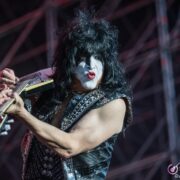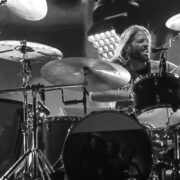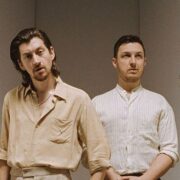Se già il debutto aveva lanciato segnali positivi circa la credibilità del progetto Des Rocs, il nuovo album “Dream Machine”, diffuso lo scorso Agosto su Sumerian Records, conferma come la creatura solista di Danny Rocco non rappresenti un fuoco di paglia. Attingendo da un serbatoio di influenze che vedono in prima linea, tra gli altri, Queen, Muse e Weezer, il musicista newyorchese, con un look da Teddy Boy e una penna da songwriter anni ’60, si propone di rivitalizzare e trasformare il vecchio e sano rock’n’roll in qualcosa di davvero originale e alternativo. Un animale da palcoscenico dotato di sostanza, che anche il pubblico italiano sembra apprezzare appieno…
—SCROLL DOWN FOR ENGLISH VERSION—
Ciao Danny e benvenuto su SpazioRock, è fantastico averti qui con noi. Come stai?
Sto benissimo. Sono a casa, a New York.
Partiamo dagli ultimi eventi, in particolare dai tre live che hai tenuto in Italia a Roma, Bologna e Milano (clicca qui per la fotogallery). Ci racconti le tue prime emozioni italiane e come il pubblico ha accolto la musica di Des Rocs?
Sono rimasto a bocca aperta. Ho scoperto che gli italiani possiedono un legame speciale non solo con la melodia della voce, ma con ogni singolo strumento sul palco. Il loro essere aperti alla spiritualità dello spettacolo era diverso da qualsiasi cosa avessi mai sperimentato.
Parliamo, adesso, della tua musica. La descrivi spesso come bedroom arena rock. Ci potresti spiegare il significato di questa definizione così originale, ma anche così contraddittoria?
Sono ossessionato dai suoni che vanno oltre la realtà, quei suoni che ti fanno visualizzare luoghi straordinari. Ma creo la mia musica in un modo del tutto antitetico rispetto agli artisti da stadio. Molti dei miei dischi sono realizzati su laptop e nelle camere da letto. Eccomi qui, dunque, seduto in un bar con le mie cuffie e immagino ottantamila anime che cantano ciò che sto scrivendo. Questo intendo per bedroom arena rock.
“Dream Machine”, uscito lo scorso agosto, è il secondo album di Des Rocs. Qual è stata l’evoluzione del tuo viaggio musicale e cosa distingue questo nuovo album dal debutto?
La mia musica è in continua evoluzione. Voglio sempre spingere. Sono nato con un incessante bisogno di esplorare. Questo nuovo album è una gigantesca espirazione dopo la pandemia. È un risveglio, sia dal punto di vista sonoro che tematico. È il passo successivo per uscire da un periodo di tremenda oscurità e riflessione.
A proposito dell’esordio, “A Real Good Person In A Real Bad Place” è stato un disco nato da un periodo personale piuttosto complesso e oscuro. Da questo punto di vista, potremmo considerare “Dream Machine” l’esatto opposto, come una scia di luce che brilla e acceca?
Non lo definirei un “opposto” quanto, piuttosto, una nuova alba. A “Real Good Person In A Real Bad Place” era una sorta di one man show di Broadway. Un monologo interiore. Era il suono di un uomo accovacciato in una stazione radio abbandonata a Brooklyn, che creava in totale isolamento all’interno di una nuvola di terrore.
Anche gli artwork dei due full-length differiscono notevolmente. La copertina del nuovo lavoro, ha, infatti, dei caldi colori pastello. Cosa rappresenta il monolite che campeggia in primo piano sulla cover?
È il simbolo di Des Rocs. È una rappresentazione della forza. Volevo ambientarlo in un contesto che sembrasse allo stesso tempo ostile e magico per dimostrare la perseveranza di tutto ciò che riguarda Des Rocs.
In questo disco, ti sei avvalso di professionisti del livello e dell’esperienza di Alain Johannes e Matt Wallace. In che modo i loro contributi hanno plasmato la direzione creativa dei brani?
Sono stati dei collaboratori straordinari. La loro energia e la loro guida sono state preziose. Storicamente, non ho lavorato bene con altri produttori, ma in questo caso ognuno si è davvero calato e distinto nel ruolo in maniera straordinaria. Tutti lavoravano per dar vita alla visione, senza mai cambiarla.

Tra le influenze che le canzoni di “Dream Machine” rivelano, possiamo citare, alla rinfusa, Queen, David Bowie, Muse, Jimi Hendrix, primi Arctic Monkeys, Weezer, persino gli ZZ Top. Durante il processo di realizzazione di pezzi, come riesci a orientarti in mezzo a così tante suggestioni senza perdere il focus principale della scrittura?
Ci sono davvero tanti artisti diversi che costituiscono le fondamenta del mio DNA musicale. Ma alla fine è tutto filtrato attraverso la mia voce e le mie storie. Non esiste una vera navigazione cosciente, invece scrivo moltissimo e mi concentro su quale raccolta di canzoni possa rendere il viaggio musicale più interessante. Voglio salire su delle montagne russe rock’n’roll che siano diverse da qualsiasi cosa chiunque abbia mai sperimentato.
Concentriamoci, ora sulle canzoni più significative. “Never Ending Moment” è il brano dell’album più ascoltato su Spotify. Qual è il suo segreto vincente?
In fin dei conti, la canzone è profondamente emozionante. Non importa quale lingua parli, la vera emozione può sempre uscire dagli altoparlanti e catturare le persone. Certamente lo fa per me.
“White Gold”, invece, sembra una danza tribale dai risvolti funk/gospel, con un songwriting che attualizza e alleggerisce la lezione di “No One Knows” dei Queens Of The Stone Age. Alain Johannes, che ha lavorato proprio con la band di Josh Homme, è in qualche modo intervenuto?
No. Il ruolo di Alain era quello di promuovere la visione di Dream Machine, non di invocare altri progetti.
“Nowhere Kid” è un inno alla solitudine la cui composizione ha avuto una storia piuttosto particolare. Originariamente l’idea era di un concept album, non è vero?
Era una traccia di un concept album che avevo scritto prima di decidere di inseguire le idee che avrebbero costituito le fondamenta di “Dream Machine”. Era basato su un protagonista che aveva perso tutto. Quando ho finito la canzone, mi sono reso conto che, anche se l’avevo scritta per un personaggio, era puramente autobiografica.
“In The Night” è, forse, il brano più complesso, soprattutto a livello di arrangiamenti. È forse la canzone di cui ti senti più orgoglioso? E come è nata?
Avevo lo scheletro della canzone da mesi, ma scriverla è stata una delle cose più impegnative che avessi mai fatto. C’erano così tante versioni diverse prima che trovasse la sua giusta casa. Preferisco non parlarne molto, per me è fondamentale che sia il pubblico a dare le proprie interpretazioni.
Danny, tu sei di New York una città molto stimolante dal punto di vista musicale, ma anche estremamente competitiva e da cui non sempre è facile emergere. In generale, qual è il tuo rapporto con la Grande Mela?
È per me quello che il sole significa per Superman. È casa mia. È dove ciascun membro della mia famiglia vive, ovunque nella città. È un pozzo infinito di ispirazione. È l’abbinamento perfetto per la mia personalità. È pura elettricità e caos. New York è tutto.
Nonostante la tua giovane età, sei stato in tournée, tra gli altri, con gruppi che hanno fatto e continuano a fare la storia come The Rolling Stones e Muse. Quale artista ti ha particolarmente sorpreso? E con chi ti piacerebbe suonare?
Sono rimasto sorpreso da tutti loro. Ho avuto la fortuna di avere una gamma ampia di esperienze di tournée diverse e ognuna mi ha insegnato qualcosa di speciale. Il mio sogno, comunque, è suonare con i Foo Fighters.
In alcune interviste, ho letto alcune tue affermazioni del tipo: “Cambierò la musica rock per sempre!“. Credi di essere sulla strada giusta? E di essere all’altezza di un obiettivo così ambizioso?
Senza dubbio. Nessun altro sta facendo qualcosa di simile a quello che sto facendo io.
Un’ultima domanda riguarda il tuo futuro artistico. Hai qualche progetto in mente, magari qualche anticipazione da condividere con noi?
Ho un sacco di cose in arrivo, ma per ora le mie labbra devono rimanere sigillate.
Grazie mille per il tuo tempo, Danny. Quale messaggio vorresti lasciare ai tuoi fan italiani e ai nostri lettori?
Vi amo da morire. E spero di rivedervi presto (prima di quanto potreste pensare).
— ENGLISH VERSION —
Hi Danny and welcome to Spaziorock, it’s great to have you. How are you?
I’m do in great, back home in the Big Apple.
Let’s start from the latest events, in particular the three live shows you held in Italy in Rome, Bologna and Milan. Can you tell us about your first Italian emotions and how the public welcomed your music?
I was blown away. I found Italians to posess a special connection to the melody of not just the vocals, but to every single instrument on stage. Their openness to the spirituality of the show show was unlike anythin gI’d ever experienced.
Let’s talk aboutyour music. You often describe it as bedroom arena rock. Can you explain the meaning of this veryoriginal and contradictory definition?
I’m obsessed with sound that are larger than life, sonics that make you visualize tremendous places. But I create my music in a way that’s entirely antithetical to arena artists. A lot of my records are made on laptops and in bedrooms. So here Iam sitting in a cafe with my headphones and imagining 80,000 souls singing along to what I’m writing. That’s bedroom arena rock.
“Dream Machine”, released in August 2023, is your sophomore album. How has your musical journey evolved since yourdebut release, and what sets this new album apart?
My music is constantly evolving. I always wanna push. I was born with a relentless need to explore. This new album is one giant exhale after the pandemic. It’s a reawakening, both sonically and thematically. It’s the next step out of a period of tremendous darkness and reflection.
Speaking of your debut, “A Real Good Person In A Real Bad Place” was a record born from a rather complex and dark personal period. From this point of view, can we consider “Dream Machine” the exact opposite, such as a trail of light that shines and blinds?
I wouldn’t call it an “opposite” as much as I’d call it a new dawn. A “Real Good Person In A Real Bad Place” was a sort of one-man Broadway show. An inner-monologue. It was the sound of a man squatting in an abandoned radio station in Brooklyn, creating in total isolation within a cloud of dread.
The artworks of the two albums also differ considerably. The cover of the new record featuring warm pastel colours. What does the monolith that stands out in the foreground represent?
This is the symbol of Des Rocs. It’s a representation of strength. I wanted to set it in an enviornment that felt both hostile and magical to demonstrate the perseverence of all things Des Rocs.
On this record you worked with professionals of the level and experience of Alain Johannes and Matt Wallace. How did their contributions shape the album’s creative direction?
They were amazing contributors. Their energy and guidance were invaluable. I’ve historically not worked well with other producers, but everyone really fell into these amazing roles that were so distinct. Everyone was working to bring the vision to life, never to change it.

Among the influences that the songs of “The Dream Machine” reveal, we can mention Queen, David Bowie, Jimi Hendrix, the first Arctic Monkeys, even ZZ Top. During the songwriting process, how do you manage to navigate so many suggestions without losing your main focus?
There are so many different artists that form the foundation of my musical DNA. But at the end of the day it’s all filtered through my voice and my stories. There’s no real concious navigation. Instead I’m writing a tremendous amount and focusing on what collection of songs makes for the most interesting musical journey. I want to curate a rock’n’roll rollercoasters that’s unlike anything anyone has experienced.
Now let’s talk about the songs. “Never Ending Moment” is the most streamed song from the album on Spotify. What is the winning secret of this track?
At the end of the day the song is profoundly emotional. No matter what language you speak, true emotion can always jump out of the speakers and grab people. It certainly does for me.
“White Gold”, on the other hand, seems like a tribal dance with funk/gospel implications, with a songwriting that updates and lightens Queens Of The Stone Age’s “No One Knows”. Did Alain Johannes, who worked with Josh Homme’s band, have anything to do with it?
No. Alain’s role was to further the vision of “Dream Machine”, not to invoke other projects.
“Nowhere Kid” is a hymn to loneliness whose composition had quite an adventurous history. Can you tell us about it? It was originally the idea of a concept album, wasn’t it?
It was a track from a concept album i’d written before I decided to chase the ideas that would form the foundation of “Dream Machine”. It was based on a protagonist who’d lost everything. When I finished the song I realized that even thoughI’d writtenit for a chracter, it was purely auto-biographical.
“In The Night” is, perhaps, the most complex song, especially in terms of arrangements. Is it perhaps the song you feel most proud of? And how was born?
I had the bones of the song for months, but writing it was one of the most challeging things i’d ever done. There were so many different versions before it found it’s proper home. I prefer not to speak much more on it, it’s crucial for me to have the audience assign their own interpretations.
Danny, you are from New York which is a very exciting city from a musical point of view, but also extremely competitive and where it is not always easy to emerge. What is your relationship with the Big Apple in general?
It’s for me what the sun is to Superman. It’s my home. It’s where every member of my family lives on every side. It’s an endless well of inspiration. It’s the perfect match for my personality. It’s pure electricity&chaos. New York City is everything.
Despite your young age, you have toured with bands that make and continue to make history such as The Rolling Stones and Muse. Which artist were you particularly surprised by? And who would you like to play around with?
I’ve been surprised with all of em’. I’ve been fortunate to have such a wide range of different Touring experiences and each one has taught me something special. My dream is to play with the Foo Fighters.
In some interviews I read some of your statements like: “I’m going to change rock music forever!“. Do you think you’re on the right track? And to be able to live up to such an ambitious goal?
Without a doubt. No one else is doing anything close to what I am doing.
A final question concerns your artistic future. Do you have any projects in mind and can you tell us something about them?
I have a whole ton on the way, but for now my lips must remain sealed.
Thanks so much for your time, Danny. What message would youlike to share with your Italian fans and our readers?
I love ya to death. And i hope to see ya again soon (sooner than ya might think).











